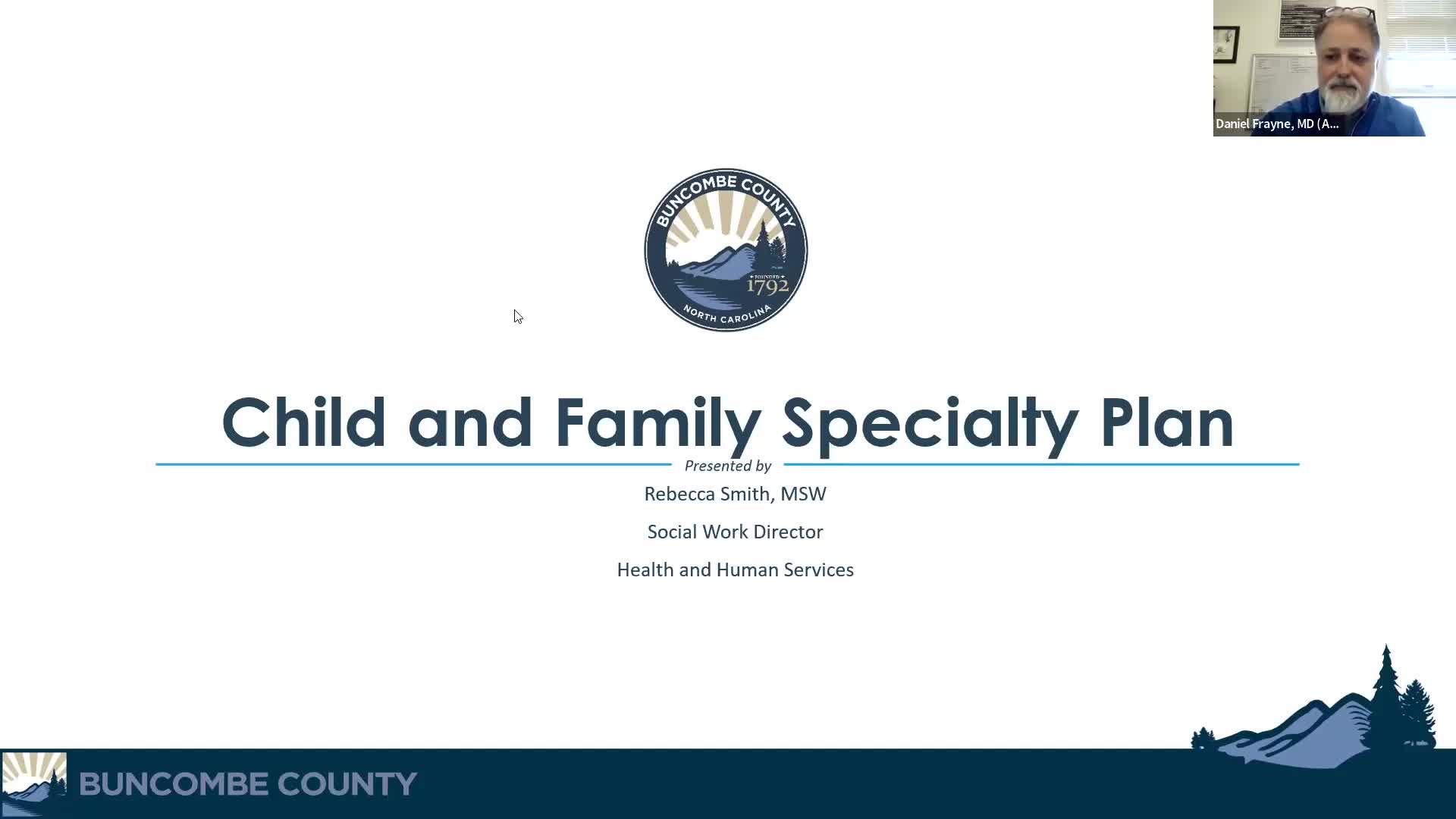Buncombe staff outline switch of foster youth Medicaid to statewide "Child and Family Specialty Plan" with Blue Cross plan
Get AI-powered insights, summaries, and transcripts
Subscribe
Summary
Rebecca presented North Carolina’s child and family specialty plan: beginning Dec. 1, foster youth and related eligible groups will be auto-enrolled in Healthy Blue Care Together (Blue Cross Blue Shield). County staff described care management changes, exemptions and local counts of affected children.
Buncombe County Department of Social Services staff told the Health and Human Services board on Friday that North Carolina will move foster children and other eligible child-welfare-involved youth onto a single statewide managed-care plan called the Child and Family Specialty Plan, beginning Dec. 1 for the first eligible group.
Why it matters: The change will shift care coordination for foster youth from local tailored plans to Healthy Blue Care Together (Blue Cross Blue Shield). County staff said the move could reduce some stigma for foster youth (new ID cards), create more holistic care management but could also risk network gaps for a small number of children with specialized placements.
Rebecca (DSS presenter) gave an overview of the plan and the schedule. The first phase, starting Dec. 1, will include children in foster care, children receiving adoption assistance, young adults formerly in foster care who are under age 26, and the minor children of those eligible individuals; that group will be auto-enrolled. A second, larger phase will allow parents, custodians and families receiving in-home child-protective services to opt in.
Rebecca said Buncombe County’s affected counts for the December 1 start include 281 children in foster care, 37 young adults in custody, 512 children receiving adoption assistance, and 374 young adults who have aged out yet remain under age 26. She noted the county does not have a count of how many minor children those eligible adults may have.
Staff emphasized Viya (the tailored plan) will continue to operate in the county for exception populations, including people on Innovations or TBI waivers and for adult services; Viya will partner in the transition for child-welfare-eligible youth. Rebecca said Buncombe will have four co-located Healthy Blue care managers to work with county staff on whole-person care; those care managers will handle both behavioral and physical-health coordination.
Rebecca raised concerns about provider-network uncertainty for a subset of 25–30 youth with very specialized needs who currently receive care from providers under contract only with Viya. She said county staff are negotiating with Healthy Blue Care Together to determine whether it will contract with those providers or whether placements might need to change. The county noted progress made in fiscal year 2025 to reduce nights children spend at the DSS office (from 130 nights in FY24 to 79 nights in FY25) and said it is monitoring whether transitions affect that progress.
Rebecca described operational steps: counties have begun distributing notices, social workers are delivering welcome packets, and initial meetings with Healthy Blue liaisons will be scheduled in November to review individual youth needs. The county will also track exceptions: children on Innovations/TBI waivers will remain with the tailored plan.
Board members asked whether the Blue Cross Blue Shield ID card could confuse families looking for providers; a board member warned that a Blue Cross card does not necessarily indicate a provider accepts Medicaid and staff said they will ensure primary-care assignments and provider acceptance are confirmed during initial meetings. A separate board member cautioned staff to be careful about relying on an assigned provider if that provider declines the patient.
Rebecca said North Carolina’s Healthy Blue Care Together website and the Medicaid health plan page contain more information and that the county is scheduling the heavy lift of outreach and warm-handoff meetings for November to prepare for Dec. 1. No formal vote or action was taken at the meeting; the presentation served as an information and planning update.
The county will monitor network contracting for highly specialized placements and will work with Viya and Healthy Blue Care Together during the transition to minimize disruption.
